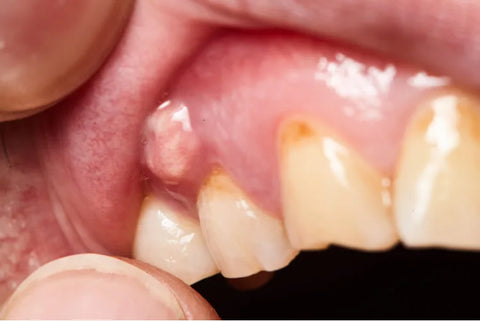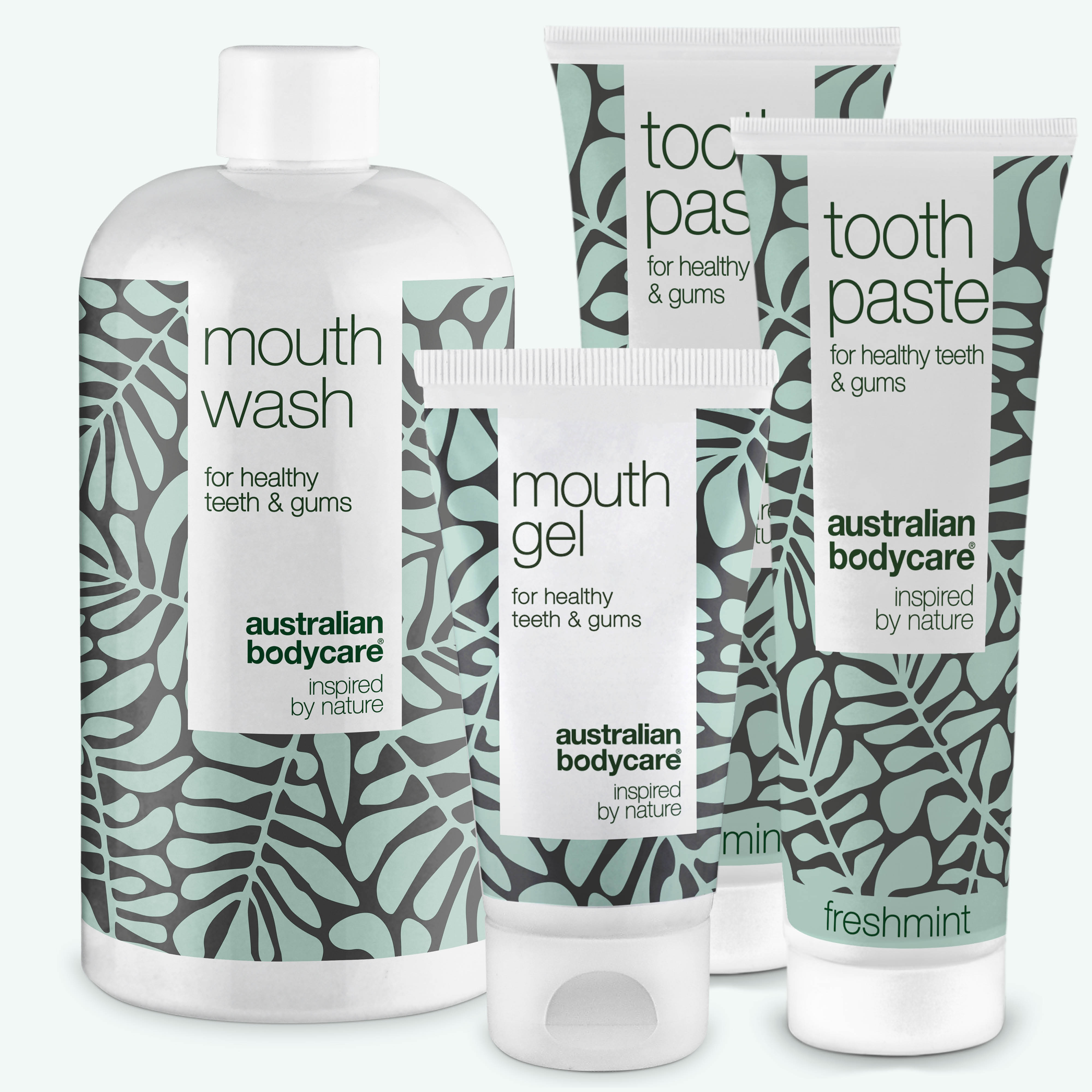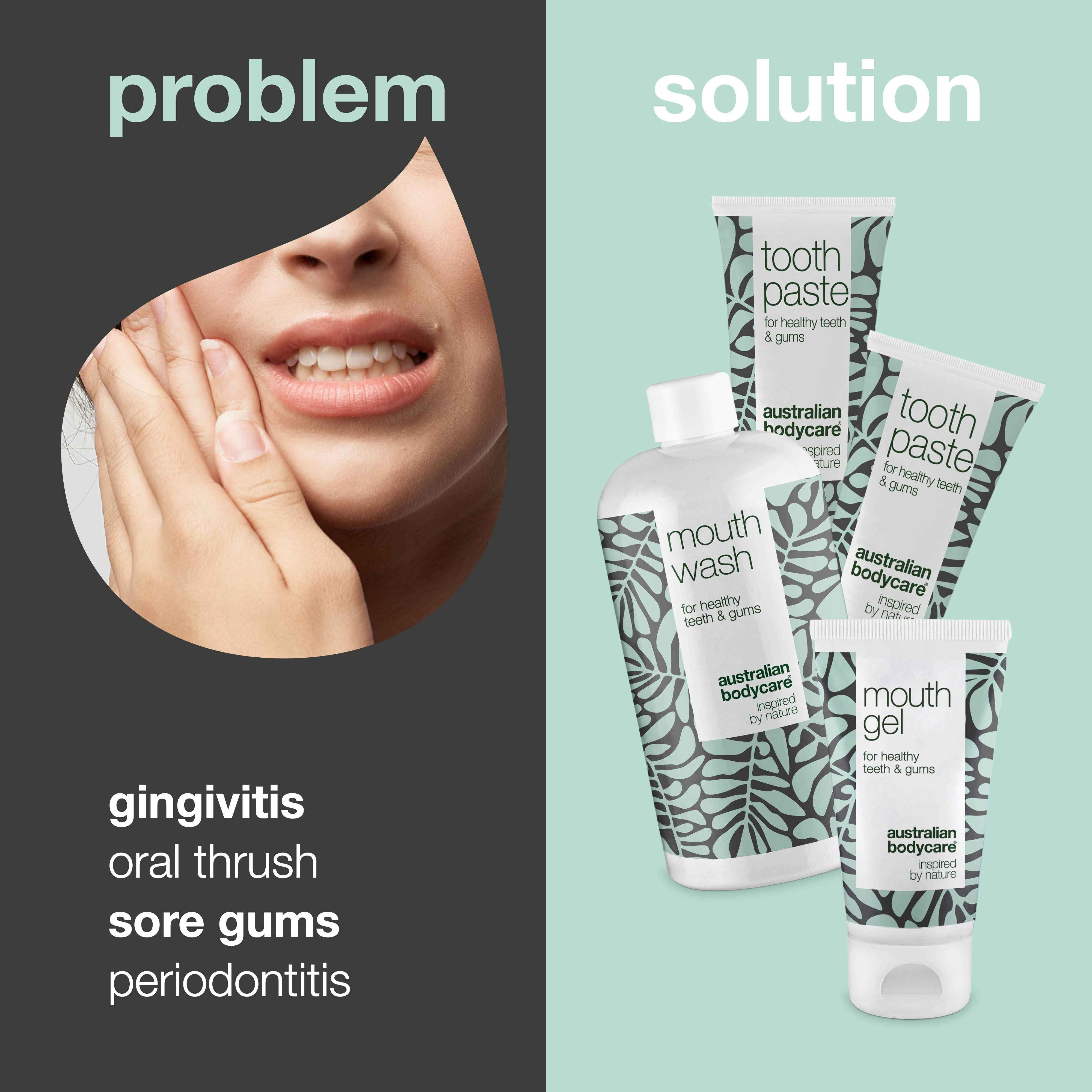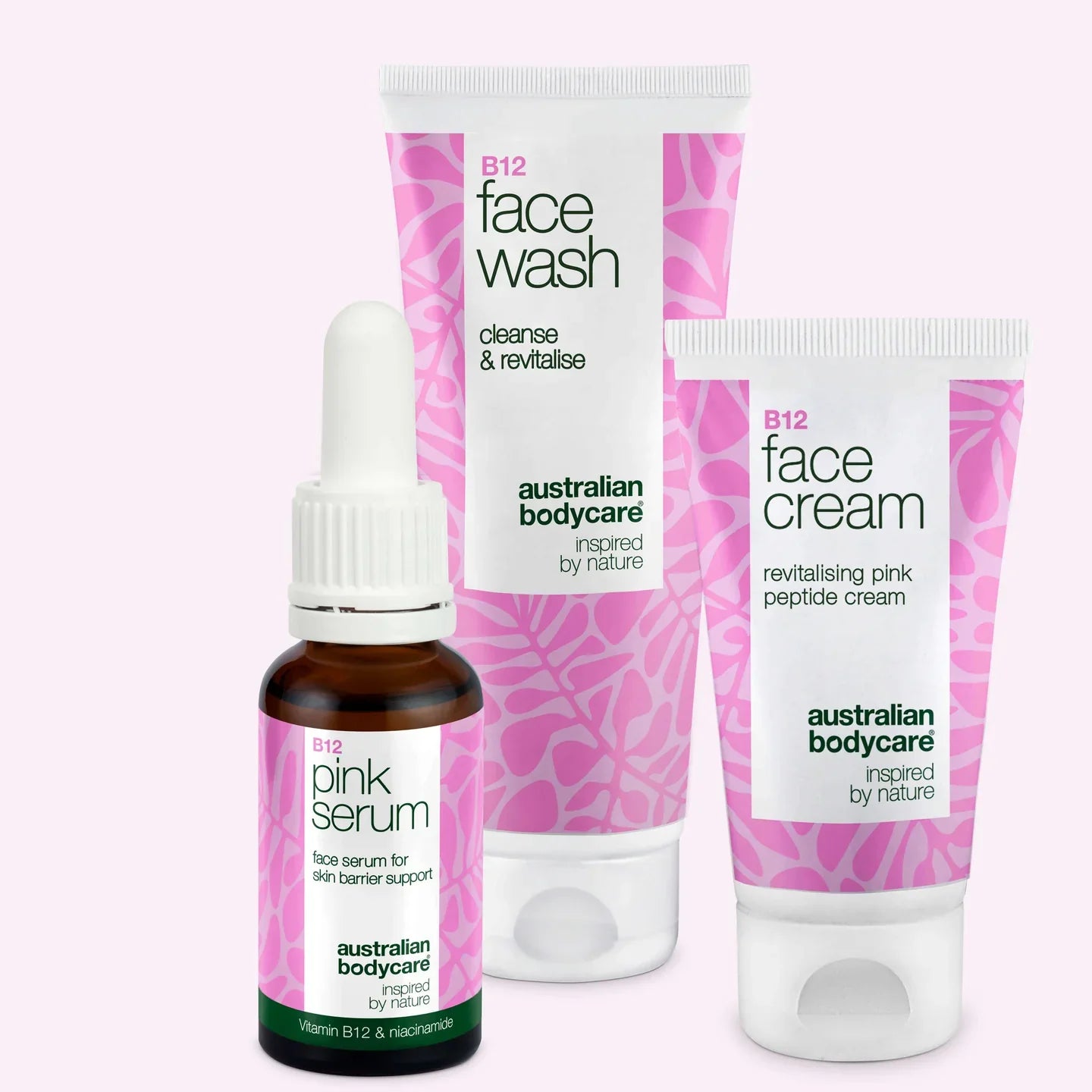Tooth Abscess: Symptoms, Treatments, and Prevention
A tooth abscess (also called dental abscess) is a serious condition where pus and inflammation gather around the teeth or in gum pockets due to bacterial infections. It can be caused by several factors, including dental trauma, untreated cavities, or a weakened immune system. Keep reading to learn more.
Table of contents
What is a Tooth Abscess?
A tooth abscess is a collection of pus resulting from inflammation. This condition usually occurs around the teeth or in the gum pockets. The inflammation is most often caused by bacteria that enter through cavities or injuries to the gums.
This process can lead to severe pain and can become even more complicated if not properly treated.
Treating a tooth abscess focuses on removing the pus and the underlying infection. Dentists may use methods such as root canal therapy or drainage to ensure that the infection doesn’t spread.
It’s crucial to address the problem quickly to prevent further health complications and ensure that the infection doesn’t reach the bloodstream.

Causes of a Tooth Abscess
Bacterial infections often cause tooth abscesses and can be due to poor oral hygiene, as well as existing dental lesions. Untreated cavities can also lead to an abscess, as bacteria can enter the tooth’s tissue and cause infection.
A weakened immune system can also increase the risk of developing tooth abscesses.
Bacterial Infections
Bacteria in the mouth can cause significant problems. They attack teeth and gums if left unchecked. This invasion often starts in small cavities or injuries to the teeth. These openings give bacteria a direct pathway into the tooth’s interior, where they can establish infections.
Once established, bacteria create abscesses filled with pus. These infections can spread if not treated quickly. Treatment is crucial to stop this spread.
Good oral hygiene is key to preventing these problems. Brush your teeth twice a day and use dental floss daily to remove food and bacterial coatings between teeth.
Regular visits to the dentist also help detect and treat cavities and periodontitis early. This can prevent bacterial infections from developing into tooth abscesses.
Remember, antibiotics may be necessary to fight the infection, along with other treatments like draining the abscess or dental procedures to remove the infected part of the tooth.
Dental Lesions
Dental lesions can lead to serious problems like a tooth abscess if not treated in time. These lesions often result from injuries to the teeth or gums. A damaged tooth gives bacteria an open door to infect and create abscesses.
Regular visits to the dental clinic can detect these issues early and prevent them from developing into something more serious. It’s important to seek professional help from a dentist if you notice signs of lesions to avoid further complications.
Besides visits to the dental clinic, good oral hygiene plays a crucial role in keeping dental lesions at bay. Brush your teeth twice daily, use dental floss regularly, and avoid excessive sugar intake to minimize the risk of lesions and the subsequent risk of a tooth abscess.
A healthy diet also strengthens the immune system, further protecting against infections in the mouth.
Untreated Cavities
Untreated cavities can lead to the formation of tooth abscesses. By identifying and treating cavities early, serious complications can be avoided.
Through regular dental check-ups, untreated cavities can be prevented, thereby minimizing the risk of tooth abscesses.
A healthy lifestyle and regular oral hygiene are important to prevent untreated cavities.
Weakened Immune System
A weakened immune system can make it harder for the body to fight inflammation around the teeth, increasing the risk of tooth abscesses. People with weakened immune systems, such as those with diabetes, are more prone to developing tooth abscesses and should be alert to symptoms like pain, swelling, and pus discharge around the teeth.
It is important for these individuals to seek professional help and maintain good oral hygiene and regular dental check-ups to prevent tooth abscesses.
Symptoms and Treatment of a Tooth Abscess
When a tooth abscess occurs, symptoms may include pain, swelling, and redness around the infected area, as well as pus discharge. Treatment often involves antibiotics to combat the infection, as well as drainage and dental procedures to remove the underlying cause of the abscess.
Pain
The pain from a tooth abscess can be intense and persistent. It often feels like a throbbing ache that worsens when touched or while chewing. This pain may also radiate to the ear or jaw.
Swelling and Redness
If you notice swelling and redness around the infected area, it could be a sign of a tooth abscess. These symptoms can be accompanied by fever and soreness when swallowing, indicating a need for immediate dental care. It's crucial to seek treatment as soon as possible to avoid further complications and relieve pain and discomfort.
Pus Discharge
Pus discharge occurs when pus and inflammation accumulate around a tooth or in gum pockets. It can cause swelling and pain and requires drainage to relieve the pressure. Treatment involves creating an outlet for the pus to prevent the spread of inflammation.
It's important to seek medical help, as untreated pus discharge can lead to serious complications.
Pus discharge may be a sign of an underlying bacterial infection or untreated cavities. It's vital to maintain good oral hygiene and seek regular dental check-ups to prevent pus discharge and other dental issues.
Antibiotic Treatment
When a tooth abscess is treated with antibiotics, the doctor will prescribe medication to combat the bacterial infection. Antibiotics help stop the inflammation and prevent the infection from spreading further.
It's important to take antibiotics in the prescribed dose and complete the course to ensure all bacteria are properly eliminated. Even if symptoms improve quickly after starting antibiotic treatment, the course must be completed to prevent the recurrence of the infection.
It's also important not to share the medication with others and to follow the doctor’s instructions regarding any side effects or special precautions during treatment.
Drainage and Dental Treatment
When a tooth abscess occurs, it may be necessary to drain the inflammation to alleviate symptoms and treat the infection.
1. Drainage involves allowing pus and inflammation to drain from the abscess to reduce pain and swelling.
2. Once pus is discharged, a dentist can perform a procedure called incision and drainage to remove accumulated pus.
3. The treatment may also include antibiotics to combat the underlying bacterial infection.
4. After drainage, the dentist will assess the need for further dental treatment, such as root canal therapy or extraction of affected teeth.
5. It's important to seek professional help, as self-drainage at home can lead to the spread of the infection.
With proper drainage and subsequent treatment, a tooth abscess can be effectively managed to avoid serious complications.
Prevention of Tooth Abscess
Good oral hygiene and regular dental visits are crucial for preventing tooth abscesses. A healthy diet and lifestyle, as well as avoiding injuries to teeth and gums, can also help prevent abscesses.
Good Oral Hygiene
Good oral hygiene involves daily brushing with fluoride toothpaste and using dental floss or interdental brushes to remove plaque and food particles between teeth. It is also recommended to use antibacterial mouthwash to reduce bacteria in the mouth.
Avoid sugary drinks and snacks, as they can increase the risk of cavities. Finally, maintaining regular dental visits is important to check teeth and maintain healthy oral hygiene.
Good oral hygiene also involves avoiding smoking, as smoking can increase the risk of gum problems and reduce the body’s ability to fight infections in the mouth.
Regular Dental Visits
Regular dental visits help prevent tooth abscesses by monitoring for cavities and tartar. By having regular dental check-ups, the dentist can identify and treat any issues in time, which can prevent the development of tooth abscesses.
Additionally, the dentist can provide advice on good oral hygiene and prevention of injuries to teeth and gums, which are also crucial for avoiding tooth abscesses.
Healthy Diet and Lifestyle
A healthy diet plays a crucial role in maintaining good oral hygiene and preventing tooth abscesses. Eating a diet rich in fruits, vegetables, and whole grains can help reduce the risk of dental problems.
Consumption of sugary foods and beverages should be limited, as they can promote cavities and bacterial growth in the mouth. Additionally, it's important to drink sufficient water, as it helps rinse away bacteria and maintain good oral moisture.
A healthy lifestyle, including avoiding smoking and excessive alcohol consumption, can also help protect teeth and gums from infections and inflammation.
Avoiding Damage to Teeth and Gums
Prevent damage to teeth and gums by avoiding chewing on hard objects such as ice or hard candy, which can cause tooth damage. Regular use of dental floss and brushes with soft bristles can help prevent gum disease.
Also, avoid tobacco products, which are linked to gum problems and cavities. Ensure you protect your teeth during sports activities by using a custom-fitted mouthguard, and avoid biting on hard objects that can damage the teeth.
By following these precautions, you can minimize the risk of damage to teeth and gums.
FAQ
What are the symptoms of a tooth abscess?
Symptoms of a tooth abscess include swelling in the cheek, pain, the possibility of fever, and if the abscess is in the gums, an abscess may be visible. Both children and adults with wisdom teeth may also experience these symptoms.
How is a tooth abscess treated?
Treatment of a tooth abscess may include taking antibiotics to combat the infection, and in some cases, it may be necessary to make a small incision to drain the abscess. Dental care is crucial to address the cause of the abscess, often a cavity or periodontitis.
Can a tooth abscess lead to more serious conditions?
Yes, if a tooth abscess is not treated, it can spread the infection to other parts of the body and potentially lead to sepsis, which is a serious condition.
How can I prevent a tooth abscess?
To prevent a tooth abscess, it's important to maintain good oral hygiene, including regular brushing and use of dental floss. Also, visit your dentist regularly for check-ups and treatment of any issues such as cavities or periodontitis before they develop.
What should I do if I think I have a tooth abscess?
If you suspect you have a tooth abscess, you should immediately contact your dentist for an examination. They can confirm the diagnosis using images of your tooth and suggest the most effective treatment for your situation.
What does a tooth abscess look like?
A tooth abscess appears as a red, swollen lump on the gum, often shiny and filled with pus. It can be visible at the root of the tooth or between the teeth. When the abscess is mature, it may have a white or yellow top, where the pus is close to the surface.





